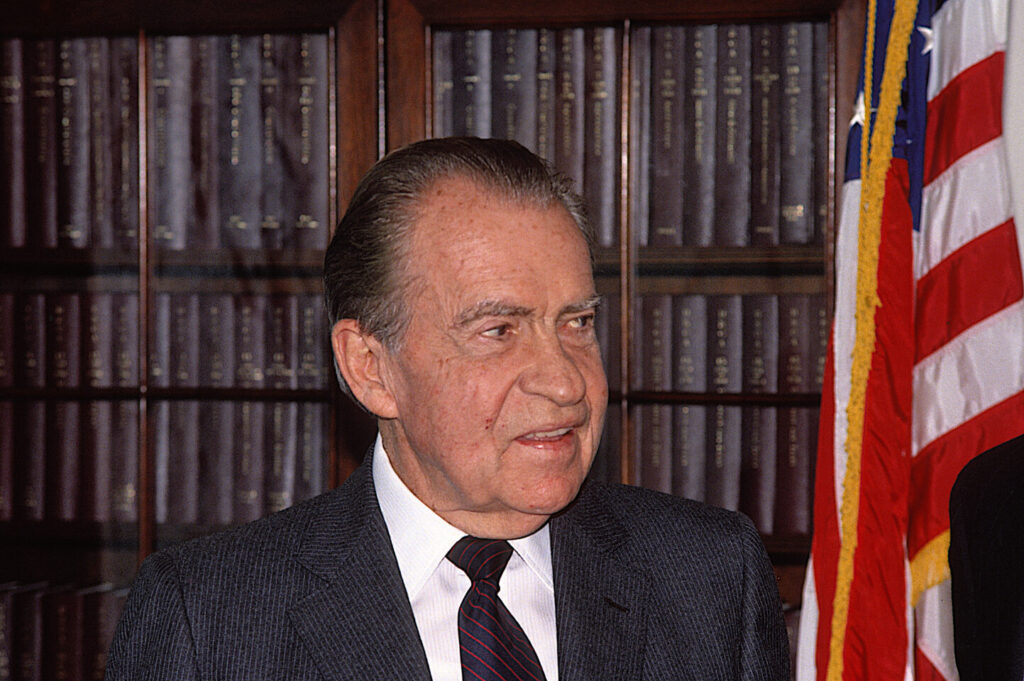
On Feb. 1, the official X account of The Drug Enforcement Administration (DEA) posted a photo of former President Richard Nixon and a caption meant to celebrate the legacy of the War on Drugs, but the comment section didn’t go as planned. Making things worse, the DEA posted it on the first day of Black History Month, which is especially ironic given that cannabis laws were unfairly enforced mostly on Black and brown Americans.
“On Dec. 14, 1970, at the White House, the International Narcotic Enforcement Officers’ Association presented President Nixon with a ‘certificate of special honor’ in recognition of the outstanding loyalty and contribution to support narcotic law enforcement,” the post reads. The post was marked with a tag for Throwback Thursday, #TBT.
A chorus of rebuttals swiftly followed as people asked essentially the same question: Is the drug war something we should be celebrating? People like Cat Packer—the director of drug markets and legal regulation at the Drug Policy Alliance and former executive director of Los Angeles’ Department of Cannabis Regulation—immediately explained why the post is fundamentally wrong on multiple levels.
“On the first day of Black History Month 2024 the Biden Administration’s DEA is celebrating President Nixon—this is the same agency responsible for marijuana scheduling,” Packer wrote.
Black Americans are arrested for violating cannabis possession laws at nearly four times the rates of white Americans, even though both demographics consume pot at relatively the same rates, the National Organization for the Reform of Marijuana Laws (NORML) notes. This racial disparity in cannabis arrests is much worse in certain areas. For instance in New York, a 2021 analysis of cannabis-related arrests in New York City’s five boroughs during 2020 reported that people of color made up 94 percent of people who were arrested. If laws cannot be enforced equally on the people, after decades of attempts, then why enforce them at all?
“It is an incredible affront to do Nixon today. You should remove this post. Nixon did more to harm the black community than any other President in the 20th century. And he did it with the War On Drugs,” Erik Radle, CEO of The Miller Ad Agency wrote in response.
Why is the War on Drugs Considered Racist?
Nixon’s own administration now admits that the War on Drugs—particularly the war on cannabis—was intentionally used as a weapon to target Black Americans and anti-Vietnam War demonstrators.
John Ehrlichman, who worked under Nixon and was a Watergate co-conspirator, blew the whistle in Harper’s Magazine in 2016—fully admitting the racist intentions of the Nixon administration in launching the War on Drugs.
“You want to know what this was really all about?” Ehrlichman asked. “The Nixon campaign in 1968, and the Nixon White House after that, had two enemies: the antiwar left and black people. You understand what I’m saying? We knew we couldn’t make it illegal to be either against the war or black, but by getting the public to associate the hippies with marijuana and blacks with heroin, and then criminalizing both heavily, we could disrupt those communities. We could arrest their leaders, raid their homes, break up their meetings, and vilify them night after night on the evening news. Did we know we were lying about the drugs? Of course we did.”
Nixon unceremoniously resigned from office under Section 1 of the 25th Amendment on August 9, 1974 when his impeachment materialized and became imminent. Throughout the history of America, only Andrew Jackson, Bill Clinton, and Donald Trump (two times) were impeached in the House, however only Nixon was completely removed from office.
Other presidents may have picked up in Nixon’s footsteps. The Atlantic ran an expose in 2019 on recently uncovered audio, captured in October 1971, alleging that then-California Governor Ronald Reagan held a damning conversation with Nixon before ascending to the Oval Office. The audio transcript shows how Reagan singled out and disparaged Black Americans before his presidency. Famously, Reagan was the president who launched the War on Drugs 2.0 along with First Lady Nancy Reagan, the “Just Say No” era when the federal government ramped up attacks on cannabis consumers and drug users.
The recent post on Feb. 1 shows the level of denial in the DEA about the success of the War on Drugs and how out of touch they are with the public. It wasn’t a success: Overdose deaths continue to hit all-time highs, billions of dollars are wasted, and the drug laws aren’t enforced fairly on Black and brown Americans.
Read full article on High Times

